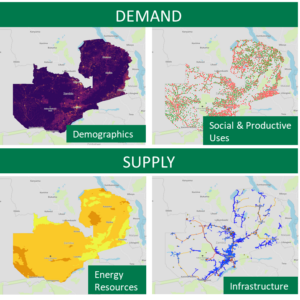Agriculture is the backbone of Ethiopia’s economy employing 67% of the working population mainly through micro, small and medium enterprises (MSME). However, the country’s economy is still struggling to provide enough jobs for the growing workforce leading to 19.1% unemployment, with the youth unemployment standing at 25.3%. The MSME sector is the second largest employer after agriculture and can stimulate more job opportunities with greater access to reliable energy.
However, for many years MSMEs in Ethiopia have relied on inefficient and costly fossil fuel energy that has hampered their growth. According to a recent study by the Jobs Creation Commission, ACE TAF and the Ethiopia Energy Market Accelerator, uptake of solar energy for agricultural processing presents an opportunity for these enterprises to create 190,000 jobs along the three high value chains of horticulture, wheat and dairy.
During the webinar held on 12 August 2021 to share findings of the study, Henock Assefa, the Managing Director, Energy Market Accelerator noted, ‘In Ethiopia there are about 70 million people under the age of 30 years and 50 million under the age of 15 years. There are about 30 million students in school and creating jobs for these is a massive task. Additionally, much like any other sub-Saharan Africa country, about 80 – 85% of Ethiopians live in the rural areas and their livelihoods are based on small scale agriculture. Creating jobs in Ethiopia means creating opportunities in agriculture and aligned services.’
The key solar powered appliances that contribute to increased production, reduction in postharvest losses and value addition in horticulture, dairy and wheat are water pumps, milk refrigerators and wheat mills, respectively. According to the analysis, solar irrigation in horticultural production can unlock $1.2billion in annual value by 2025. This value is realized from the 300% increase in production and the resulting 130,000 jobs created. In the dairy sector, solar milk cooling can unlock $1.3 billion in revenue by 2025, while solar wheat mills can unlock $1.05 billion in annual value by the same year.
For these additional jobs to be realized, key barriers that have hindered widespread adoption of these technologies need to be addressed. These include inadequate knowledge of end-user appliance demand, limited access to finance for suppliers and affordability constraints for most MSMEs. There is also inadequate information on where MSMEs can access durable appliances. To address these challenges more awareness needs to be created on the range of appliances available and their socio-economic impact, suppliers and MSMEs need access to low interest credit, and enforcement of quality standards and tax policies.
Ethiopia’s Plan of Action for Job Creation has eight pillars two of which form the essence of this study. These are transforming the business ecosystem to build vibrant and growth oriented MSMEs and realizing the job potential of prospective high yield sectors. The report therefore provides recommendations that government can implement with the support of development partners and private sector, and make progress towards creating 14 million jobs in Ethiopia by 2025.










